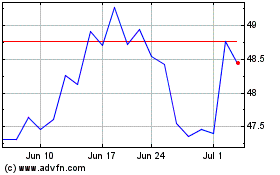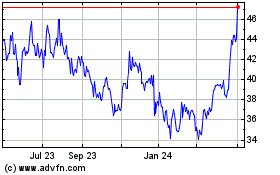By Steven Russolillo and Alexandra Wexler
This article is being republished as part of our daily
reproduction of WSJ.com articles that also appeared in the U.S.
print edition of The Wall Street Journal (March 23, 2018).
One of the oldest and largest investors in Tencent Holdings Ltd.
is selling close to $10 billion of shares in the Chinese internet
giant, reducing one of the world's most lucrative tech bets at a
time of turbulence for the sector.
Naspers Ltd., a South African media and internet firm, said
Thursday it will sell 190 million shares of Tencent, cutting its
stake in the company to 31.2% from 33.2%. The stock was priced at
405 Hong Kong dollars (US$52) a share on Friday morning in Hong
Kong, a 7.8% discount to Tencent's closing price the previous
day.
The sale represents a windfall for Naspers, which paid just $34
million for its Tencent stake in 2001 -- before it went public -- a
position that is now valued at roughly $175 billion. It hadn't sold
any of its Tencent stock before and said it won't sell any more of
its shares for at least three years.
Tencent, best known in China for its WeChat messaging app and
being the world's largest videogame publisher by revenue, has
surged to become one of the world's most valuable technology
companies. Its shares have nearly doubled over the past year,
catapulting the company's market capitalization to about $532
billion, putting it ahead of Facebook Inc. and Berkshire Hathaway
Inc.
Tencent's shares fell 5% on Thursday in Hong Kong after the
company's quarterly results, reported a day earlier, showed slowing
revenue growth from mobile and PC games, one of its main profit
drivers.
A Tencent representative said the company was aware of Naspers's
intention to sell a stake and said the company's company's
commitment to not sell any more shares for several years "indicates
confidence in our long-term growth and management."
Naspers, which has become Africa's most valuable company in
large part because of its Tencent stake, said it would use the
proceeds from the share sale to invest in its classifieds, online
food delivery and financial-technology businesses, as well as to
pursue other growth opportunities. Naspers shares dropped about 8%
in response to the news and another 4.6% on Thursday in South
Africa trading.
The sale comes at a sensitive time for global technology stocks,
which have been on a tear for much of the past year.
Facebook shares have tumbled this week, with the company losing
about $46 billion of its market value after criticism over its
handling of user information. The controversy has prompted renewed
calls for governments around the world to better regulate giant
technology companies that have amassed large volumes of user data.
The tech-heavy Nasdaq Composite has fallen in six of the past eight
trading days, and is down 5.6% from its record earlier this
month.
The sale of Tencent shares could add more pressure to global
tech stocks. Tencent, along with search giant Baidu.com Inc. and
e-commerce titan Alibaba Group Holding Ltd., make up the three
so-called BAT stocks that, because of their size, clout and market
dominance in Asia, are routinely compared with the U.S.'s closely
watched FAANG stocks -- Facebook, Amazon.com Inc., Apple Inc.,
Netflix Inc. and Alphabet Inc.-owned Google.
A survey this week by Bank of America Merrill Lynch found that
the "long FAANG+BAT" trade -- meaning investors who have piled into
these technology giants -- was the most crowded trade on Wall
Street.
Nevertheless, Naspers will still be a major shareholder in
Tencent and several other tech companies. The company, founded in
1915 as a newspaper publisher, also holds stakes in a host of other
tech firms, including Mail.ru Group, a Russian internet company
that runs two of the country's three biggest social networks;
Delivery Hero, a food-delivery company based in Germany; and
Flipkart, India's biggest e-commerce site.
Naspers trades at a discount to the market value of its Tencent
stake in part because of a dividend-withholding tax that would kick
in should it ever sell out. The tax doesn't apply to Thursday's
share sale because the company isn't returning proceeds to
shareholders. The company's market value was recently about $115
billion, according to FactSet, accounted for Thursday's sharp
fall.
In November, Naspers, led by Chief Executive Bob van Dijk,
reported a 98% rise in half-year net profit to $1.1 billion,
largely driven by its Tencent holding and its digital classified
businesses, which turned a profit for the first time.
Some analysts said they were surprised by the sale but cautioned
against reading too much into the move.
"To keep it in context, Tencent is a great business that Naspers
is sitting on huge profits from," said Richard Kramer, founder of
Arete Research. "Whether they own 20% or 30%, it's still a
phenomenal asset and puts them in a privileged position."
--Alyssa Abkowitz and Adria Calatayud contributed to this
article.
Write to Steven Russolillo at steven.russolillo@wsj.com and
Alexandra Wexler at alexandra.wexler@wsj.com
(END) Dow Jones Newswires
March 23, 2018 02:48 ET (06:48 GMT)
Copyright (c) 2018 Dow Jones & Company, Inc.
Tencent (PK) (USOTC:TCEHY)
Historical Stock Chart
From Aug 2024 to Sep 2024

Tencent (PK) (USOTC:TCEHY)
Historical Stock Chart
From Sep 2023 to Sep 2024
